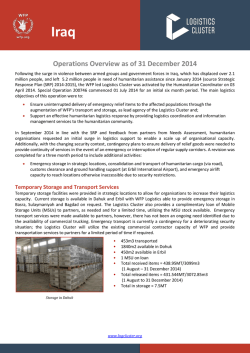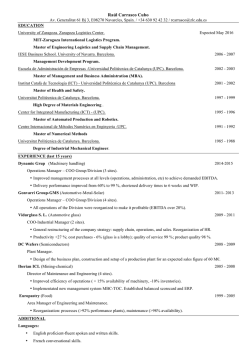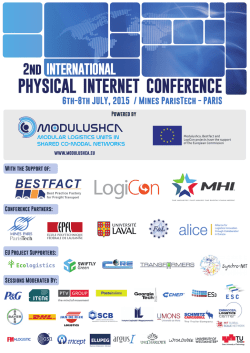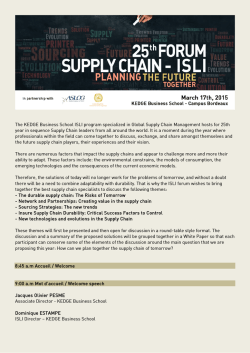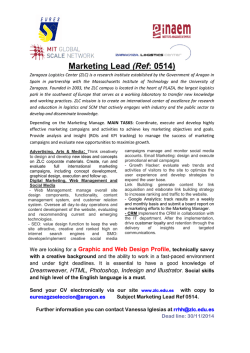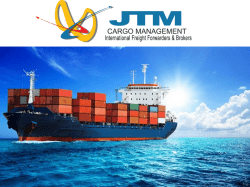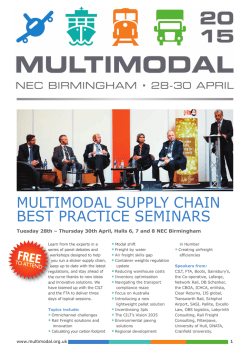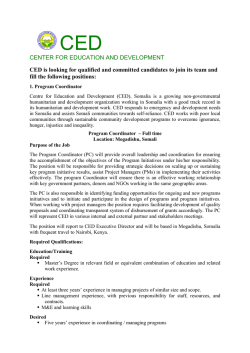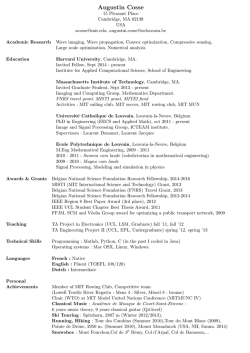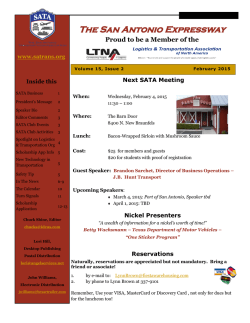
Workshop: “Future research directions on urban last mile distribution”
Workshop: “Future research directions on urban last – mile distribution” Speakers: • • • • Dr. Matthias Winkenbach – Director del Megacity Logistics Lab | MIT Center for Transportation and Logistics Ricardo Giesen – Professor at Pontificia Universidad Católica de Chile Daniel Merchan – PhD Student of MIT Megacity Logistics Lab Alejandra Cuevas – PhD Student of Pontificia Universidad Católica de Chile Friday October 23rd, 2015 – 10:00 am, at Sala CS302 – Edificio Ciencias de la Salud UC More information about MIT Megacity Logistics Lab: http://megacitylab.mit.edu/ Dr. Winkenbach’s Presentation Summary: Future directions of research on urban last-mile distribution The talk will mainly be about future directions of research on urban last-mile distribution. In particular, it will outline three major building blocks of our research at the MIT Megacity Logistics Lab: urban distribution network design, urban freight policies and logistics best practices, and the implications of data and technology innovations on urban logistics. Regarding distribution network design, I discuss how we can use mathematical modeling to support the design of better multi-tier urban distribution networks and how these networks can be designed to support omni-channel distribution strategies of companies. I will briefly cover continuous approximation techniques used to account for optimal routing cost in closed form. Regarding urban freight policy and logistics best practices, I will give examples of how we supported the design of urban freight policies, the improvement of urban freight infrastructure, and the dissemination of urban logistics best practices in the past to encourage more efficient and reliable goods transportation in congested and dense urban areas. Regarding data and technology innovation, I will highlight how advances in vehicle and engine technology, the analysis of large GPS and transactional datasets, the wide-spear availability of low-cost sensor technology and mobile phones, the Internet of Things, augmented reality technologies, and autonomous technologies can affect future last-mile delivery operations and how research could support these trends. Ricardo Giesen’s Presentation Summary: High-Resolution Analysis to Improve Home-delivery Operations Technological advances offer the possibility of capturing high-resolution data about freight distribution operations and managing commercial vehicle fleets in real-time. These new opportunities introduced more complexity to an already challenging problem. In this context, researchers have tackle uncertainty and dynamic conditions in fleet management operations. Nevertheless, in most dynamic fleet management studies the focus has been on the efficiency of the routing piece, assuming that the demand is an exogenous process. In this talk, we present research topics related to the study of fleet management decisions in the home-delivery industry using real-time high-resolution data, obtained from GPS devices, focusing on the trade-off between level of service and efficiency in a dynamic context. In addition, we will take into account not only the efficiency of fleet management strategies, but also their sustainability in terms of the net impact on greenhouse gas emissions. Daniel Merchan’s Presentation Summary: Urban Transshipment Networks This work develops a systemic approach for enabling transshipment operations in congested urban areas, based on two fundamental city logistics needs: efficient utilization of existing infrastructure and flexibility for logistics operators. Specifically, this research introduces the concept of urban transshipment networks (UTNs), a collection of strategically located urban logistics spaces, for efficient and flexible last-mile delivery operations in congested urban areas. By implementing the UTN framework, logistics operators can select the transshipment locations, vehicle types and operating schedules that best fit specific distribution strategies, and, simultaneously, comply with access restrictions and overcome some of the logistics complexity of dense urban zones. This concept is particularly relevant for retail dynamics observed in large metropolitan areas in the emerging world. Alejandra Cuevas’s Presentation Summary: Urban Logistics in Multiple Stakeholders Project As any highly dense city, Santiago has begun to experience the problems of congestion, pollution and other externalities related to transportation. Authorities have mostly focus on solutions and measures to increase sustainability of transport for people. However, goods movement is an important aspect of daily transport activities in the city. Although it fundamental role in economic and sustainability, urban freight have always been regulated without a deep understanding on the demand characteristics. Recently Santiago’s municipality has launched an ambitious project: Santiago’s Integral Mobility Plan. With the project priority focusing on pedestrians, bikes and public transportation, urban logistics face a great challenge: enable economic efficiency under new restrictions in order to achieve a more sustainable city.
© Copyright 2026
